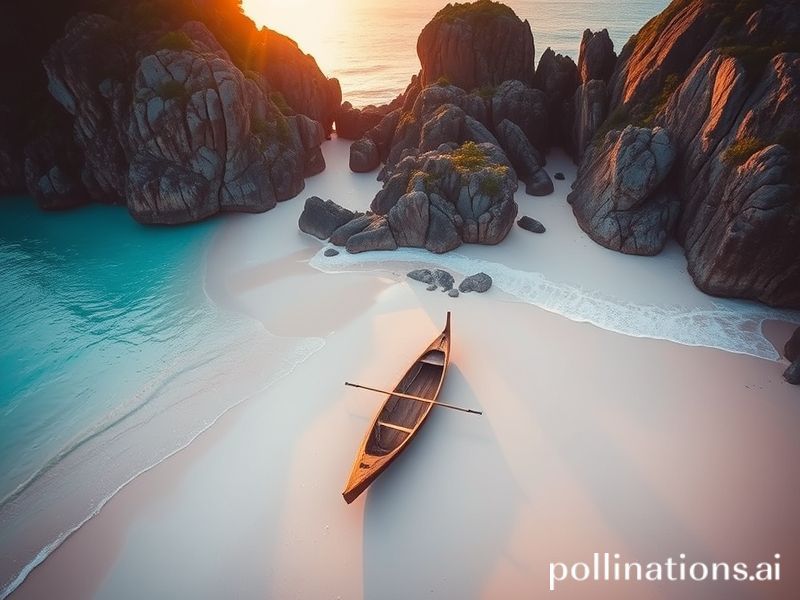The Seychelles: Where Paradise Rents Itself to the Highest Geopolitical Bidder
The Seychelles, that perfumed comma of granite and coral flung across the western Indian Ocean, has long served as a convenient metaphor for whatever geopolitical itch the world needs scratched. Once a dependable postcard of honeymoon clichés—turquoise water, coco-de-mer nuts shaped like anatomically improbable buttocks—it now doubles as the planet’s most improbably strategic speck. At 175 square miles, the archipelago is roughly the size of a medium Costco parking lot, yet it hosts military drones, climate bond roadshows, and Russian oligarchs trying to tan the sanctions right off their reputations. If you squint, you can almost hear the islands sigh, “Again?”
The West rediscovered the Seychelles in 2009, when U.S. drones began humming out of a discreet little annex at Mahé’s airport. Terrorists in Yemen—never the best neighbors—were misbehaving, and Washington needed a spot with decent runway cafés and minimal press. The Seychelles government, ever pragmatic, accepted rent money and politely ignored the sound of Hellfire missiles ruining the sunset. In return, America got a base without the colonial aftertaste of Diego Garcia, and the Seychelles got a fresh coat of paint on its sovereignty. Everyone declared victory, proving yet again that in international relations, hypocrisy is just diplomacy spelled backward.
Not to be outdone, China arrived with a different kind of payload: tourists, suitcases fat with yuan, and an offer to build a coast-guard base on Assumption Island. Beijing insists the facility is purely for anti-piracy and “fishery research,” a phrase that translates roughly to “whatever keeps the shipping lanes open for our Belt, Road, and occasional Debt.” The Seychelles, drowning in sovereign debt like the rest of us but with better snorkeling, listened attentively. After all, when your biggest export is the illusion of paradise, you quickly learn that sovereignty is a negotiable asset—like beachfront timeshares but with more flags.
Meanwhile, the European Union discovered that the Seychelles is an excellent place to park climate guilt. Having overfished their own waters into a state of aquatic trauma, EU trawlers now pay for the privilege of vacuuming up tuna under the watchful eye of Seychellois observers who, rumor has it, occasionally mistake binoculars for napping masks. Brussels then buys “blue bonds” that promise to protect the very reefs their trawlers’ anchors are busy pulverizing. It’s a fiscal ouroboros: the snake eats its own tail, then applies for green certification.
All of this transactional affection has produced the world’s most boutique superpower crisis. The Seychelles now boasts the highest per-capita foreign military presence on Earth—roughly one foreign sailor for every four locals—yet remains officially non-aligned, like Switzerland with humidity. Its passport sells briskly on the gray market, its waters teem with both whale sharks and submarine listening arrays, and its president gamely attends every climate summit to remind everyone that 90 percent of his country could be underwater by 2100. The international community responds with standing ovations and new debt instruments, because nothing says “we care” like a sustainability-linked loan at 7.5 percent.
For ordinary Seychellois, global fascination translates into a daily carnival of contradictions. Fishermen WhatsApp coordinates to Chinese survey ships, hotel staff serve breakfast to drone pilots on R&R, and environmental NGOs stage beach cleanups sponsored by the same cruise lines that dump their trash overboard at night. The local Creole phrase for “no problem”—“pa en pwoblem”—has become a national shrug: existential absurdity rendered in three syllables.
As sea levels rise and great-power competition heats up, the Seychelles offers a preview of the planet’s future: a beautiful, crowded lifeboat where everyone insists they’re just visiting. The islands will likely stay above water long enough to host the final G-20 summit, at which point delegates can toast their own adaptability while ankle-deep in what used to be a runway. Until then, paradise remains open for business—terms and conditions apply, collateral damage extra.







